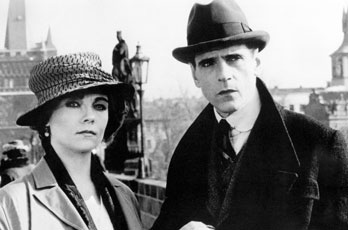Glimpsing
the Kafkaesque through Kafka
by Dilshan Boange
  The evolution of western literature and the craft of fiction has benefitted
immensely from the works of Franz Kafka who wrote in the German language and was
a native of the city of Prague. The highly imagination driven story conceptions
of Kafka and defining elements that characterise his fiction gave rise to the
word “Kafkaesque”. One aspect of what this word means is the presence of
illogical, senseless, bizarre elements in the mundane world to an extent that
the ‘realness’ of our existence is brought to question while dwelling deeper
into inquiring what controls our world and our lives. There is a great sense of
disjointedness from ‘rational reality’ that defines the quality of ‘Kafkaesque’. The evolution of western literature and the craft of fiction has benefitted
immensely from the works of Franz Kafka who wrote in the German language and was
a native of the city of Prague. The highly imagination driven story conceptions
of Kafka and defining elements that characterise his fiction gave rise to the
word “Kafkaesque”. One aspect of what this word means is the presence of
illogical, senseless, bizarre elements in the mundane world to an extent that
the ‘realness’ of our existence is brought to question while dwelling deeper
into inquiring what controls our world and our lives. There is a great sense of
disjointedness from ‘rational reality’ that defines the quality of ‘Kafkaesque’.
Recently on YouTube I had the chance to watch the movie Kafka by internationally
acclaimed Cannes award winning director Steven Soderbergh. The full movie can be
watched on YouTube and is titled ‘Kafka 1991’. The film will prove to be a treat
to anyone who appreciates the noir genre with an unconventional touch that
delivers novelty to the viewer’s experience. The film features Academy Award
winning British actor Jeremy Irons in the lead role playing the eponymous Kafka.
Irons delivers a powerful performance which speaks much of his depth as a gifted
artist of the screen.
Kafka has a storyline that blends biographical aspects of the writer Franz Kafka
with elements in Kafka’s fiction. The novel The Castle by Kafka has lent much of
its substance to the storyline in Soderbergh’s film. And anyone who has read The
Castle will instantly spot the elements taken off the pages and woven into the
screen work when watching this film. To a fan of the arts and letters I feel
Kafka will prove to be a rewarding experience. It presents something of an
‘urban gothic thriller’ set in early 20th century Prague and builds on the theme
of dystopian terror.
From a point of studying the craft of cinematic narrative and adoption of
literary fiction to the art of cinema, Soderbergh’s Kafka presents a stimulating
work, which by my understanding, provides an excellent ground to glimpse how
(the) Kafkaesque quality appears in cinema. One can only imagine what Franz
Kafka who had only limited fame and financial success during his life time would
feel were he to watch Kafka where his life and his art are made to coalesce as
though he –Franz Kafka, was living out the very stories he created on paper.
|

